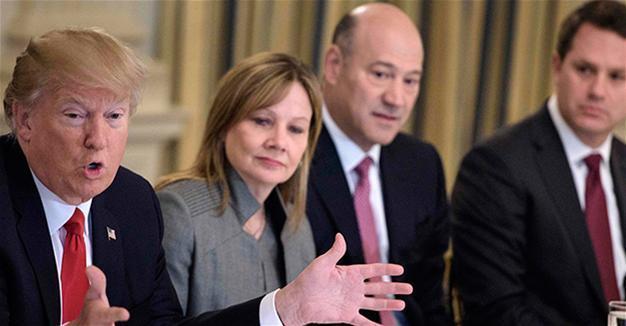Trump disbands business councils after CEOs quit in protest
WASHINGTON/NEW YORK - Reuters
 U.S. President Donald Trump disbanded two high-profile business advisory councils on Aug. 16 after several chief executives quit in protest over his remarks blaming weekend violence in Virginia on anti-racism activists as well as white nationalists.
U.S. President Donald Trump disbanded two high-profile business advisory councils on Aug. 16 after several chief executives quit in protest over his remarks blaming weekend violence in Virginia on anti-racism activists as well as white nationalists.A parade of prominent Republicans also rebuked Trump, as well as U.S. ally Britain, leaving him increasingly isolated after his comments on Tuesday about the bloodshed in the college town of Charlottesville further enveloped his seven-month-old presidency in controversy.
The mayor of Phoenix asked Trump to delay a rally planned for next Tuesday, an appeal the president appeared to reject.
A memorial service was held on Aug. 16 in Charlottesville for 32-year-old Heather Heyer, who was killed when a car plowed into anti-racism protesters on Saturday. A 20-year-old Ohio man said to have harbored Nazi sympathies has been charged with her murder.
Trump, a real estate magnate who had never before held public office, was elected president in November touting his experience in the business world and ability to strike deals. However, some of the Republican president’s actions and words have alienated many corporate leaders.
He said he would dissolve the American Manufacturing Council and the Strategic and Policy Forum after eight executives, including Campbell Soup Co CEO Denise Morrison and 3M Co CEO Inge Thulin, quit the panels.
Both councils were moving to disband on their own when Trump made his announcement on Twitter.
“Rather than putting pressure on the businesspeople of the Manufacturing Council Strategy Policy Forum, I am ending both,” he wrote.
The Strategic and Policy Forum was headed by Blackstone Group CEO Stephen Schwarzman, a close ally of Trump in the business world. Schwarzman organized a call on Wednesday for member executives to voice concerns after Trump’s comments, and an overwhelming majority backed disbanding the council, two sources said.
Schwarzman then called Trump to tell him about the decision to disband.
Campbell Soup Co’s Morrison said: “Racism and murder are unequivocally reprehensible and not morally equivalent to anything else that happened in Charlottesville.”
JPMorgan Chase Co CEO Jamie Dimon, a member of one of the panels, said in a statement that “fanning divisiveness is not the answer.”
Dow Chemical Co Chief Executive Andrew Liveris, who headed the manufacturing council, said he told the White House on Wednesday that “in the current environment it was no longer possible to conduct productive discussions.
“The Strategic and Policy Forum was intended to advise Trump on how government policy impacts economic growth, job creation and productivity. The manufacturing council was designed to promote U.S. job growth.
‘Divide our nation’
Along with the snubs from business leaders, Trump was rebuked by a string of Republicans including Senate Majority Leader Mitch McConnell, Ohio Governor John Kasich, Senator Lindsey Graham and former U.S. Presidents George H.W. Bush and George W. Bush.
Trump needs the support of fellow Republicans as he tries to push his policy agenda, including tax cuts, through a Congress that is controlled by the Republicans.
Phoenix Mayor Greg Stanton, a Democrat, said Trump would “enflame emotions and further divide our nation” if he used next week’s rally to pardon Joe Arpaio, a former Arizona sheriff who was found guilty last month of criminal contempt of court.
Arpaio gained a national profile due to his harsh treatment of inmates and outspoken opposition to illegal immigration.
Shortly after Stanton’s statement, Trump urged supporters on Twitter to attend the Phoenix rally.
Few public figures have voiced support for Trump over his response to the violence.
Vice President Mike Pence, who is cutting short a trip to Latin America, told reporters in Chile that “I stand with the president and I stand by those words.”
Former Ku Klux Klan leader David Duke praised Trump’s “honesty and courage,” while Richard Spencer, head of a white nationalist group, lauded the president for “speaking the truth.”
U.S. stocks ended slightly firmer but off the day’s highs as investors worried that the backlash to Trump’s remarks could stunt his ability to deliver on pro-business promises.
‘Unıted states in economic war with China’
White House strategist Steve Bannon argued forcefully in an interview published on Aug. 16 that the United States is in an “economic war” with China, and the confrontation with nuclear-armed North Korea is just “a sideshow.”
To me the economic war with China is everything. And we have to be maniacally focused on that,” he said in the interview with the American Prospect, a left-leaning website.
“If we continue to lose it, we’re five years away, I think, ten years at the most, of hitting an inflection point from which we’ll never be able to recover,” he said.
Bannon, an economic nationalist and former CEO of the extreme-right Breitbart news website, is reported to be on shaky ground with President Donald Trump, who gave him only a tepid endorsement this week.But in a frank, freewheeling telephone interview with American Prospect editor Robert Kuttner, Bannon talked about the infighting in the White House, now engulfed in a storm over Trump’s defensive response to deadly violence at a white supremacist rally in Virginia.Bannon also was dismissive of Trump’s vow to bring down “fire and fury” on North Korea if it continued to threaten the U.S. with missiles and nuclear weapons.
















